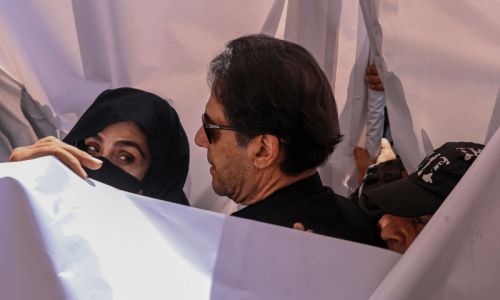WITH the targeted assassination of Hamas leader, Ismail Haniyeh, in Tehran on July 30 and a Hezbollah commander in Beirut a day before, the Middle East is once again overcast by the dark clouds of a possible war. Israeli officials are gloating that the head of Hamas, which had carried out the Oct 7, 2023, strike on Israel, has been killed. However, they can never rest in peace because in the past 10 months, their country has killed nearly 40,000 innocent residents of Gaza and erased much of its infrastructure.
Global public opinion has turned against Israel, including in the US, which is by far Israel’s staunchest supporter. During the recent address to the US Congress by Israeli Prime Minister Benjamin Netanyahu, most TV channels were telecasting the demonstrations taking place inside the Capitol building. Many sober voices in the US, like Senator Bernie Sanders, have openly criticised the welcome accorded to a war criminal.
Tragically, the US and most Western governments continue to support Israel and refuse to condemn its crimes against humanity despite the fact that the International Court of Justice and International Criminal Court have both called out Israel for its war crimes in Gaza. Israel has also ignored, with impunity, the calls of the UN for ceasefire. It is striking that the Western countries, which take great pride in championing the cause of universal human rights, and even lecture the rest of the world on these issues, are silent in the face of the genocide unfolding in Gaza.
So, the question arises as to why the US (and the European countries) are standing so firmly behind Israel. There are indications that the US is increasingly concerned about losing its dominance in the Middle East, which it had propelled all these years mainly through Israel and its Arab friends. Iran at the regional level, and Russia and China at the global level, have challenged the American dominance.
Israel is desperately seeking to embroil Iran in a war.
Israel is now desperately seeking to embroil Iran in a war with the objective of taming the country, which has consistently refused to accept US and Israeli hegemony in the Middle East. However, defeating Iran will not be easy because, notwithstanding its recent intelligence failures, Iran has systematically extended its influence in the region from Iraq to Syria to Lebanon. Despite differences in Yemen, Iran has also sought to normalise ties with Saudi Arabia. All this is a setback for Israel.
An earlier attempt by Israel to provoke Iran — via an attack on the latter’s consulate and Iran’s counter strike — did not lead to a full-scale war partly because the US was not ready to get involved in a wider conflagration. This is Israel’s second attempt to engage Iran in a war that Israel thinks it can win thanks mainly to American support. Much to Israel’s dismay, both Iran and America have opposed such a war so far for their own respective reasons. However, Israel continues to test Iran’s patience, hoping to use the broader war theatre to divert global attention from its atrocities in Gaza, and in the process, create space for a ‘Greater Israel’, which has been its cherished goal.
At the global level, the prevailing world order is in disarray and a new balance of power is yet to emerge. The US is firmly locked in a major power competition with a rising China and resurgent Russia. Since the US has a clear advantage in terms of military capabilities, being the largest military spender, it would prefer to engage China in a kinetic conflict to erode the latter’s recently gained economic and military prowess.
Having effectively embroiled Moscow in Ukraine, Wash-ington would be keen to see Beijing get involved in either of the two theatres of global contestation: the South China Sea and Taiwan, or the Middle East. China has so far prudently avoided a kinetic conflict around the question of Taiwan and the South China Sea, despite provocations by the US.
In the Middle East, too, China is reluctant to get involved in any war, and has focused, instead, on increasing its influence in the Middle East by facilitating unity amongst Palestinian factions, and earlier, by brokering Iran-Saudi reconciliation.
With the killing of the Hamas chief, who was involved in peace talks, the chances of a wider war cannot be ruled out. The provocation is so grave that Iran has no choice but to respond in kind. That said, Iran, the US, and all Arab countries would not want a wider war because of the enormous destruction that it can cause in the region and beyond. As for China’s involvement, its preference all along has been to not enter into any war that impedes its own national development plans.
The writer is a former foreign secretary and author of Diplomatic Footprints.
Published in Dawn, August 4th, 2024














































Dear visitor, the comments section is undergoing an overhaul and will return soon.